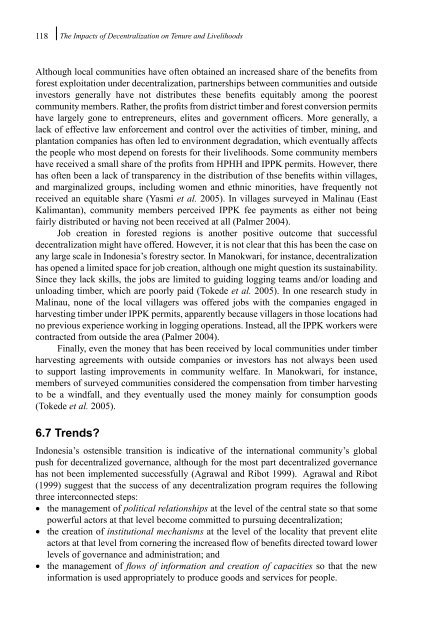Decentralization of Forest Administration in Indonesia, Implications ...
Decentralization of Forest Administration in Indonesia, Implications ...
Decentralization of Forest Administration in Indonesia, Implications ...
Create successful ePaper yourself
Turn your PDF publications into a flip-book with our unique Google optimized e-Paper software.
118<br />
The Impacts <strong>of</strong> <strong>Decentralization</strong> on Tenure and Livelihoods<br />
Although local communities have <strong>of</strong>ten obta<strong>in</strong>ed an <strong>in</strong>creased share <strong>of</strong> the benefits from<br />
forest exploitation under decentralization, partnerships between communities and outside<br />
<strong>in</strong>vestors generally have not distributes these benefits equitably among the poorest<br />
community members. Rather, the pr<strong>of</strong>its from district timber and forest conversion permits<br />
have largely gone to entrepreneurs, elites and government <strong>of</strong>ficers. More generally, a<br />
lack <strong>of</strong> effective law enforcement and control over the activities <strong>of</strong> timber, m<strong>in</strong><strong>in</strong>g, and<br />
plantation companies has <strong>of</strong>ten led to environment degradation, which eventually affects<br />
the people who most depend on forests for their livelihoods. Some community members<br />
have received a small share <strong>of</strong> the pr<strong>of</strong>its from HPHH and IPPK permits. However, there<br />
has <strong>of</strong>ten been a lack <strong>of</strong> transparency <strong>in</strong> the distribution <strong>of</strong> thse benefits with<strong>in</strong> villages,<br />
and marg<strong>in</strong>alized groups, <strong>in</strong>clud<strong>in</strong>g women and ethnic m<strong>in</strong>orities, have frequently not<br />
received an equitable share (Yasmi et al. 2005). In villages surveyed <strong>in</strong> Mal<strong>in</strong>au (East<br />
Kalimantan), community members perceived IPPK fee payments as either not be<strong>in</strong>g<br />
fairly distributed or hav<strong>in</strong>g not been received at all (Palmer 2004).<br />
Job creation <strong>in</strong> forested regions is another positive outcome that successful<br />
decentralization might have <strong>of</strong>fered. However, it is not clear that this has been the case on<br />
any large scale <strong>in</strong> <strong>Indonesia</strong>’s forestry sector. In Manokwari, for <strong>in</strong>stance, decentralization<br />
has opened a limited space for job creation, although one might question its susta<strong>in</strong>ability.<br />
S<strong>in</strong>ce they lack skills, the jobs are limited to guid<strong>in</strong>g logg<strong>in</strong>g teams and/or load<strong>in</strong>g and<br />
unload<strong>in</strong>g timber, which are poorly paid (Tokede et al. 2005). In one research study <strong>in</strong><br />
Mal<strong>in</strong>au, none <strong>of</strong> the local villagers was <strong>of</strong>fered jobs with the companies engaged <strong>in</strong><br />
harvest<strong>in</strong>g timber under IPPK permits, apparently because villagers <strong>in</strong> those locations had<br />
no previous experience work<strong>in</strong>g <strong>in</strong> logg<strong>in</strong>g operations. Instead, all the IPPK workers were<br />
contracted from outside the area (Palmer 2004).<br />
F<strong>in</strong>ally, even the money that has been received by local communities under timber<br />
harvest<strong>in</strong>g agreements with outside companies or <strong>in</strong>vestors has not always been used<br />
to support last<strong>in</strong>g improvements <strong>in</strong> community welfare. In Manokwari, for <strong>in</strong>stance,<br />
members <strong>of</strong> surveyed communities considered the compensation from timber harvest<strong>in</strong>g<br />
to be a w<strong>in</strong>dfall, and they eventually used the money ma<strong>in</strong>ly for consumption goods<br />
(Tokede et al. 2005).<br />
6.7 Trends?<br />
<strong>Indonesia</strong>’s ostensible transition is <strong>in</strong>dicative <strong>of</strong> the <strong>in</strong>ternational community’s global<br />
push for decentralized governance, although for the most part decentralized governance<br />
has not been implemented successfully (Agrawal and Ribot 1999). Agrawal and Ribot<br />
(1999) suggest that the success <strong>of</strong> any decentralization program requires the follow<strong>in</strong>g<br />
three <strong>in</strong>terconnected steps:<br />
• the management <strong>of</strong> political relationships at the level <strong>of</strong> the central state so that some<br />
powerful actors at that level become committed to pursu<strong>in</strong>g decentralization;<br />
• the creation <strong>of</strong> <strong>in</strong>stitutional mechanisms at the level <strong>of</strong> the locality that prevent elite<br />
actors at that level from corner<strong>in</strong>g the <strong>in</strong>creased flow <strong>of</strong> benefits directed toward lower<br />
levels <strong>of</strong> governance and adm<strong>in</strong>istration; and<br />
• the management <strong>of</strong> flows <strong>of</strong> <strong>in</strong>formation and creation <strong>of</strong> capacities so that the new<br />
<strong>in</strong>formation is used appropriately to produce goods and services for people.

















